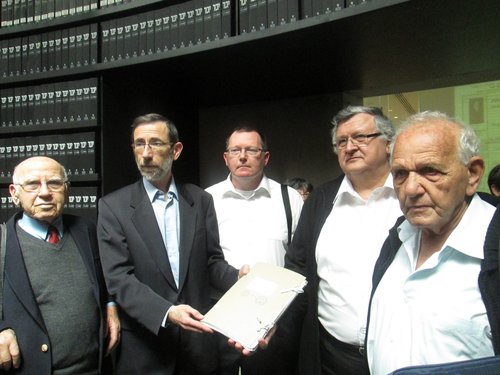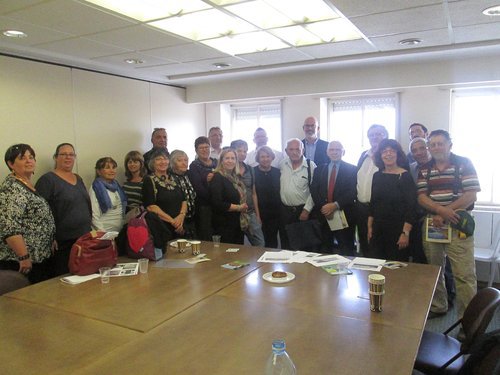The Jas Vasem Institution in Jerusalem welcomed a delegation from the Csenger Reformed Congregation with a ceremony to commemorate the unique material that the delegation contributed to the Institution's collection, which helped elaborate on the common past of the reformed and Jewish from Csenger.
On the 6th of March Gyula Bartha (dean of the Reformed Presbytery of Szabolcs), Zoltán Tőkés (pastor of Csenger) and Csaba Kormos (pastor of Pocsalma) were given a warm reception, including a ceremony and the hoisting of the Hungarian flag, and from the Jas Vasem Institution's leadership Director Alexander Avram, his co-workers and 30 emigrants from Csenger were also in attendance. On the occasion, the Hungarian visitors presented the data of 252 Jewish residents from Csenger who were deported during the Second World War. Before the Holocaust 600 Jews lived in the eastern Hungarian town of which 225 citizens’ personal data could be identified.

We learned from Dean Gyula Bartha that the data collected from the state registration includes the full name, marital status, trade, date of birth and death, occasionally place of death as well. "It is a case without parallel, that a reformed congregation has collected the data of the Jewish community living in the same area from their own resources. To express this, we were welcomed with such great respect and gratitude in Israel that we did not expect," said the dean, who interpreted the greetings of Presiding Bishop Gusztáv Bölcskei at the ceremony as well.
The idea and the initiative came from 85-year old Viktor Hirschfeld from Askelno Israel, who collected the data of the people being deported from Porcsalma, a village in the neighborhood of Csenger, where he used to live. The retired agricultural engineer still has close relations with his hometown of Pocsalma. He visits the village regularly, once a year accompanied by his children and grandchildren who study Hungarian culture.

During their visit in Israel, the Hungarian delegation presented the Hungarian emigrants with materials decorated with photographs depicting the cemetery and the synagogue among many other things.
Gyula Bartha gave a lecture on the life and the good relationship of the Jews and non-Jews in Csenger. "The Holocaust Year is an opportunity to rethink what connects us, instead of what separates us," the dean summarized, stating also that after such a positive reception he will encourage other deans to start similar initiatives, because "it would heal wounds."
reformatus.hu; translated by Anita Polgári